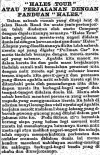Hale's Tours in Singapore and Hong Kong
- PMID: 40786640
- PMCID: PMC12333203
- DOI: 10.1080/17460654.2025.2501566
Hale's Tours in Singapore and Hong Kong
Abstract
Since Raymond Fielding's essay on the subject, Hale's Tours and Scenes of the World - an exciting multi-sensory simulation of train travel involving wagon-like auditorium and moving image projection - have received noteworthy attention from early cinema scholars. Despite Hale's Tours being a worldwide phenomenon, however, the focus has been on North America and Western Europe. To our knowledge, there are only two properly referenced contributions on Hale's Tours (or its clones) outside these regions - in Singapore and Rio de Janeiro. Focusing on regions outside North America and Western Europe, however, is crucial for arriving at a more representative understanding of historical spectatorship and the affects the device produced. By drawing on English, Chinese, and Malay sources, this essay, therefore, expands our understanding of the Hale's Tours by investigating their first appearances in Asia in Singapore (1908) and Hong Kong (1912).
© 2025 The Author(s). Published by Informa UK Limited, trading as Taylor & Francis Group.
Conflict of interest statement
No potential conflict of interest was reported by the author(s).
Figures







References
-
- Bottomore, Stephen. 1999. “The Panicking Audience?: Early Cinema and the ‘Train Effect’.” Historical Journal of Film, Radio and Television 19 (2): 177–216. doi: 10.1080/014396899100271. - DOI
-
- Burns, James. 2000. “Watching Africans Watch Films: Theories of Spectatorship in British Colonial Africa.” Historical Journal of Film, Radio and Television 20 (2): 197–211. doi: 10.1080/713669717. - DOI
-
- Census of England and Wales . 1911. https://archive.org/details/b32183185_0001/page/n23/mode/2up?view=theater.
-
- Census of the British Empire . 1901. https://archive.org/details/b32183173/page/122/mode/2up?view=theater.
-
- Conde, Maite. 2006. “Screening Rio: Cinema and the Desire for ‘The City’ in Turn-of-the-Century Brazil.” Portuguese Studies 22 (2): 188–208. doi: 10.1353/port.2006.0012. - DOI
LinkOut - more resources
Full Text Sources
